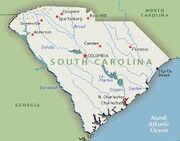
South Carolina is a state in the Southeastern United States. It is bordered to the north by North Carolina; to the south and west by Georgia, located across the Savannah River; and to the east by the Atlantic Ocean. Originally part of the Province of Carolina, the Province of South Carolina was the first of the 13 colonies that declared independence from the British Crown during the American Revolution. The colony was originally named by King Charles II of England in honor of his father Charles I (Carolus being Latin for Charles). South Carolina was the first state to ratify the Articles of Confederation, and the 8th state to ratify the US Constitution on May 23, 1788. South Carolina later became the first state to vote to secede from the Union which it did on December 20, 1860. It was readmitted to the United States on June 25, 1868.
South Carolina is the 40th most extensive and the 24th most populous of the 50 United States. South Carolina comprises 46 counties. The capital and largest city of the state is Columbia.
History[]
What follows is the history of South Carolina from a British Colony, to a Republic, to a member of the US, to another Republic, member of the CSA, and again part of the US.
Colonial Period[]
King Charles granted a charter to eight aristocrats to settle the Carolinas. The Carolina Colony was split into North, and South due to geography.
1st Republic of South Carolina[]
On March 26, 1776, the colony adopted the Constitution of South Carolina becoming the first republic in America. John Rutledge was elected as the republic's first president. He was succeeded by Rawlins Lowndes (under the title of Governor) who served from March 6, 1778 to January 9, 1779. On February 5, 1778, South Carolina became the first state to ratify the Articles of Confederation, the initial governing document of the United States, and thus being the first official member of the union.
The Federal Era[]
2nd Republic of South Carolina[]
On December 20, 1860, when it became clear that Abraham Lincoln would be the next president, South Carolina became the first state to declare its secession from the Union. In 1861, along side six other states, the Republic became a founding member of the Confederate States of America. This 2nd Republic was never recognized by any foreign power save that of other secessionist states who themselves where unrecognized.
CSA[]
Reconstruction[]
Government[]

State House of South Carolina
South Carolina is a Constitutional Bicameral Unitary Republic.
Executive[]
The Governor of South Carolina is the chief executive of the state. The governor is elected for a four-year term and may serve up to two consecutive terms. Each executive officer is elected at the same time as the governor. The separately elected positions allow for the possibility of multiple parties to be represented in the executive branch. The Governor's Cabinet also contains several appointed positions. In most cases, persons who fill cabinet-level positions are recommended by the governor, and appointed by the Senate.
Legislative[]
The Senate is the upper house of the state, it's legislative branch being bicameral, with the lower house being the House of Representatives. Both houses make up the Grand Assembly. The Senate is meant to represent the people of the state, while the House of Representatives are meant to represent the counties. The senate is made up of 46 senators elected from single member districts for four-year terms at the same time as United States Presidential elections. The house consists of 124 Representatives elected to two year terms at the same time as US Congressional elections. Unlike many legislatures, seating on the floor is not divided by party, but is arranged by county delegation. This is a legacy of the original apportionment of the chamber. Until 1964, each county was a legislative district, with the number of representatives determined by the county's population.
Judicial[]
The Family Court deals with all matters of domestic and family relationships, as well as generally maintaining exclusive jurisdiction over cases involving minors under the age of seventeen, excepting traffic and game law violations. Some criminal charges may come under Circuit Court jurisdiction.
Constitution[]
The constitution of the state is the governing document of the state. It has gone though several revisions. Until 1778 the Angelican Church was established as the State Religion. The articles doing so where abolished in order to fit the terms of the US Bill of Rights. The State does not have it's own Bill of Rights, relying solely on the Federal Bill of Right in such matters. In 1790 the state took on a more democratic tone with the Grand Assembly being granted influence over every aspect of the government. In 1865, after the American Civil War, the constitution abolished property requirements to vote, made it so the Governor was elected by popular vote rather then appointed by the Grand Assembly, and granted the Governor power of Veto. The state was readmitted into the union upon ratification of the revisions. In 1868 a new Constitution was ratified by popular vote. This Constitution established the state's educational system, created counties, abolished race restrictions on male suffrage, and removed property ownership as a requirement to hold office. The 1895 Constitution takes a step back, as it included voter requirements meant to discourage colored voters. Such legislation is no longer in effect. South Carolina's Constitution is one of the few where grounds of divorce are set. This creates an odd situation where changes to the the states divorce policy, and proceedings require the constitution to be amended.
Some features considered unique to the constitution of South Carolina with in the United Stares are as follows;
- A two-thirds majority vote of the South Carolina House of Representatives is required to impeach the governor and other state officials, as opposed to the simple majority required by the U.S. Constitution and most other state constitutions.
- The adjutant general, head of the South Carolinian Armed Forces (South Carolina National Guard, South Carolina Air Guard, and South Carolina State Guard), is an elected official. South Carolina is the only state where this is the case.
- Due to extremely strict annexation laws passed by the General Assembly in 1976, incorporated municipalities in South Carolina are usually much smaller in area and population than those elsewhere in the fast-growing Southeast. However, when adjacent suburbs which would be annexed elsewhere are added in, they exhibit sizes and rates of growth similar to many municipalities in neighboring states, such as Georgia and North Carolina.
Armed Forces[]

South Carolina is protected by the US Armed forces, however it maintains it's own militia force as guaranteed in the 2nd Amendment of the United States Constitution. "A well regulated Militia, being necessary to the security of a free State, the right of the people to keep and bear Arms, shall not be infringed." The South Carolina State Guard is the direct decedent of the revolutionary war forces the held Fort Sumter against British Assault, a battle that inspired the Star Spangled Banner. The South Carolina State Guard functions along side the National Guard, which is the federal militia of the United States.
